
“The positive impact that a pet can have on the lives of their human partners with disabilities and mental health challenges cannot be overstated! Pet owners report feeling less lonely because of the presence of their pets. At the same time, they are less stressed because having a pet offers you the opportunity to get out of your house and meet new people. Pets make you more sociable and social support is very important for one’s mental health.” [1]
“Having a pet has numerous health benefits according to the Center for Disease Control and Prevention (CDC).” [4]
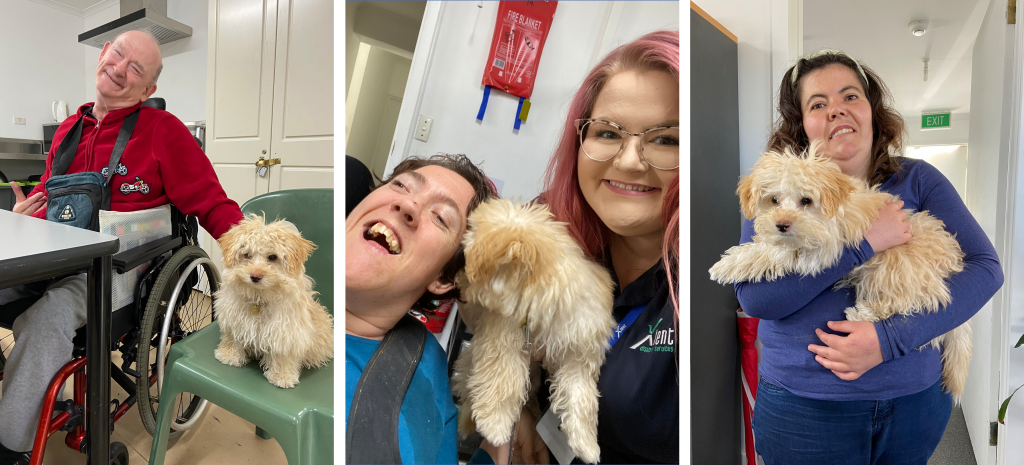
Let’s explore these benefits in more detail…
- Disabled Individuals and Their Pet Companions
“Pets have an innate ability to forge deep emotional connections with their owners, and this bond is especially meaningful for disabled individuals. In stressful circumstances, the presence of a faithful and nonjudgmental friend can ease feelings of loneliness and isolation by giving a source of comfort and support.” [2]
- Service Dogs Prevent Injuries
“With thorough and appropriate training, dogs can perform and wide variety of crucial tasks for people with disabilities that keep them safer. People who suffer from epilepsy can benefit from a service dog that can detect the onset of seizures and alert the owner so that they can prepare for what follows. People with balance challenges rely on their furry companions for stability. Service animals help deaf and blind people successfully navigate a hearing and seeing world. The list goes on but the goal, first and foremost, is adhere to their training and take good care of their owner.” [1]
Dogs are known for their incredible sense of smell, which makes them the perfect animals for identifying specific scents that are linked with medical conditions.” [5]
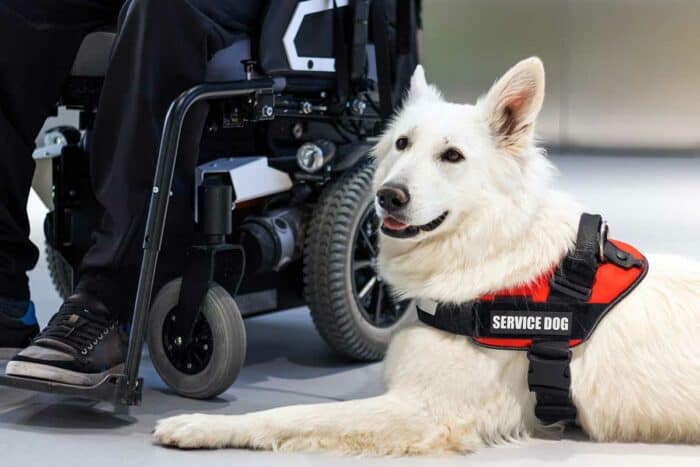
- Pets and Their Effect on Blood Pressure and Arthritis
“With arthritis, inflammation can occur in joints, constricting arteries and reducing the rate blood can flow through the body to supply muscles with oxygen. The restricted flow leads to increased blood pressure, which is troubling for arthritis patients as they are at a 50% higher risk of heart attacks.
So, it’s essential to reduce blood pressure, and pets can help. Pets have therapeutic calming auras. When a pet is in your lap, you talk, stroke and nestle into its warmth, forgetting your worries, which decreases your heart rate. When you are tired or nervous, it’s nice to have a companion.” [3]
- Fish Tanks Are Relaxing
“Many people think about a cat or a dog when they imagine pets. However, there are many other species that can be an asset to people with disabilities and the community at large. You have surely gone to the dentist. Many of them have fish tanks in the waiting room, but have you ever wondered why? It is not to decorate the room, as some might think. It is because watching at a fish tank is relaxing and it relieves your anxiety, underlines a college paper writing service. Research has shown that watching a fish tank for at least 30 minutes a day slows your heart rate, helps you relax and makes you less tense. At the same time, taking care of a fish is simpler that other animals.” [1]
- Increased Independence and Mobility Through Pet Ownership
“For individuals seeking increased independence and mobility, pet ownership can be a transformative experience. The presence of a furry companion can offer a sense of empowerment, providing support and assistance in daily activities. In this post, we will look at how pet ownership may help people gain independence and mobility, allowing them to traverse the world with more confidence.” [2]

- Learning is enriched through engagement with animals.
Whether it’s a hermit crab or a chinchilla, animals have been shown to stimulate learning. Some teachers rely on a classroom pet to invigorate creative writing assignments, bring a math problem to life and teach overall responsibility.
For students with learning disabilities, attention deficit, obsessive-compulsive disorder or anxieties, the presence of a pet both lowers stress level and opens the mind to new ideas and learning. In addition, the tactile stimulation of stroking or brushing a pet can help children with physical and developmental disabilities develop their fine motor skills. According to Learning Disability Today, “Encouraging nonverbal children to read to a therapy animal can often be more effective than interacting with trained speech therapists and reading coaches, allowing the child to exercise their free will in a situation free of judgement or expectation.” [1]
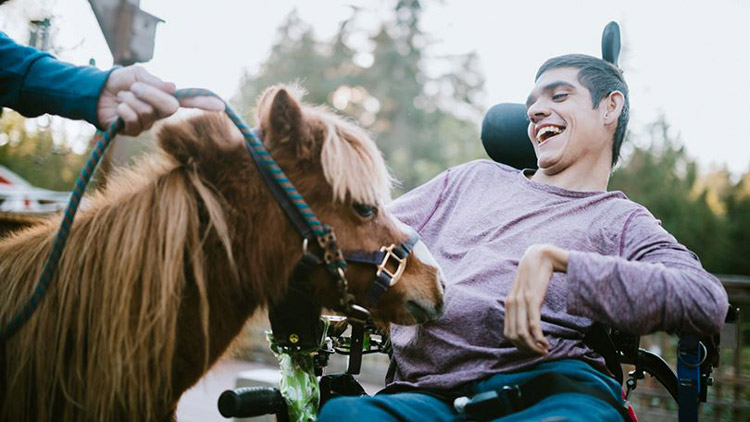
- Boosting Mental Health
“There have been many studies that have shown the positive and calming effects animals, and specifically, dogs can have on those who struggle with stress, anxiety and depression.
For those suffering from depression, a pet can help give an owner a sense of purpose and reason to get out of bed in the morning, while also providing a positive distraction from other issues. Dogs are also great for encouraging daily walks and exercise and can give someone a sense of purpose, knowing that their pet relies on them.
Studies have also shown that cuddling a pet can help lower heart rate, which can be especially helpful for those affected by anxiety or panic attacks. Pets can also assist with social anxiety by giving owners an easy ice breaker, an improved sense of confidence, and a reason to socialize like going to the dog park.” [5]
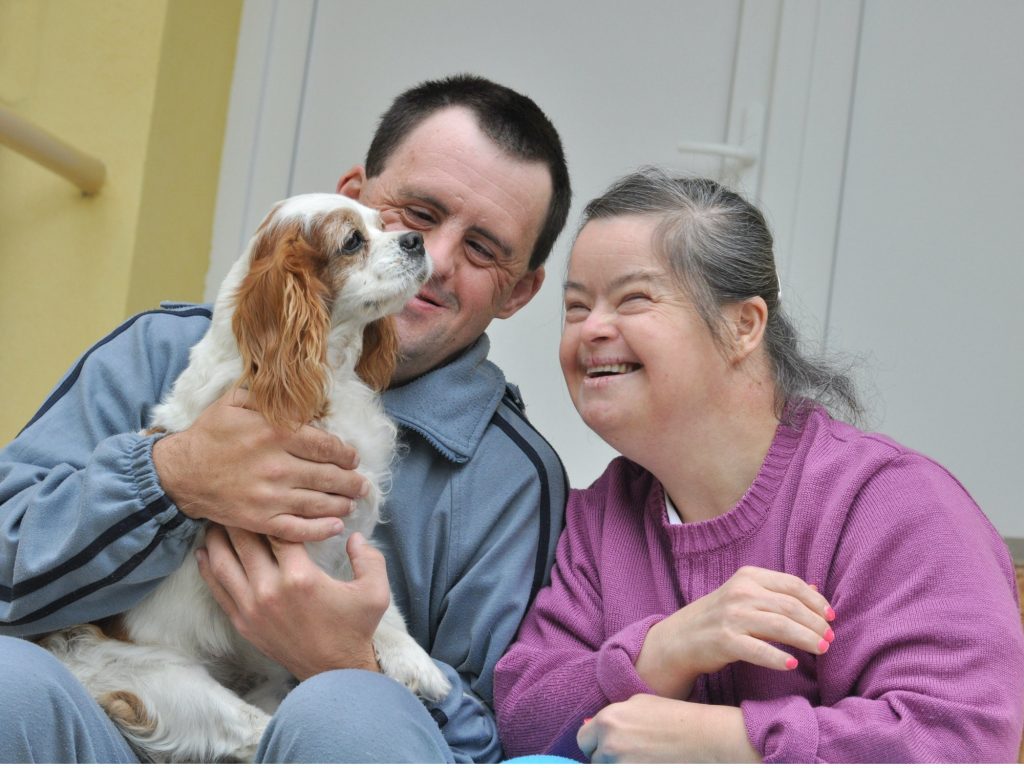
“In the disabled community, we are most grateful for our pets whether they are certified service animals or unofficial support pets. In a formal aspect, pets can provide service in various forms:
- Guide Animals
- Medical Assistance Animals
- Psychiatric Service Animals
- Hearing Alert/Signaling Animals
- Sensory Signal Animals or Social Signal Animals
- Mobility Animals
- Seizure Alert Animals”
- Therapeutic Support” [6]
“Whether a pet is supporting you through recovery, pain flares, anxious moments, or is a service animal trained to guide you through busy city streets— all of our pets are instrumental in how we journey through our disabilities. The benefits of having a pet are boundless for disabled people and the larger community. If you are considering welcoming a pet into your life, consider the health benefits and how your emotional and physical health may be positively impacted.” [6]
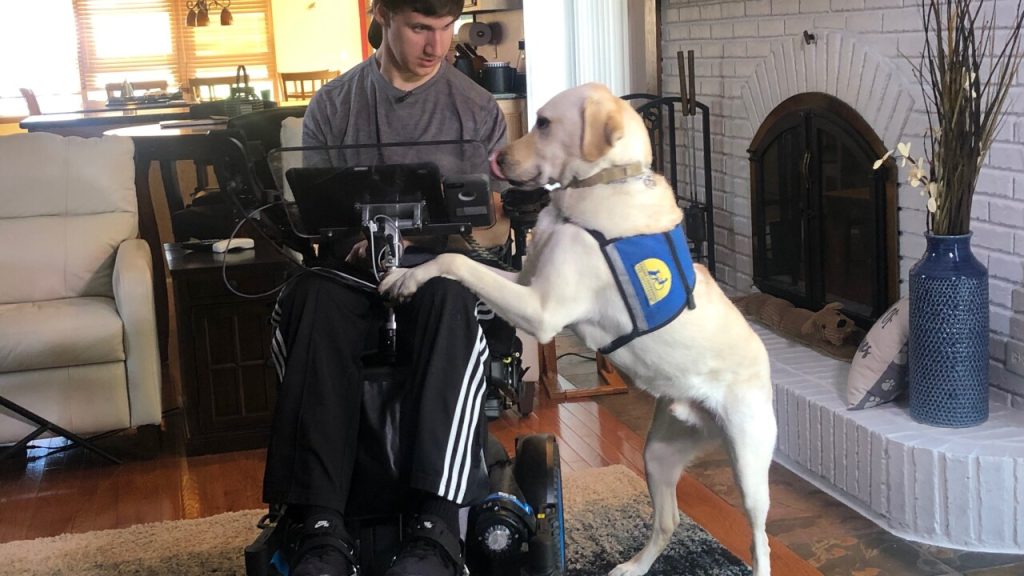
Resources
[2] https://fashionfrenzy.net/the-benefits-of-disabled-people-owning-a-pet/
[3] https://www.tenura.co.uk/the-benefits-of-disabled-people-owning-a-pet
[4] https://ahi.org/the-bonds-between-disabled-people-and-their-pets/
[5] https://realcommunityservices.com.au/animals-and-disability/
[6] https://community.thriveglobal.com/the-bonds-between-disabled-people-and-their-pets/
